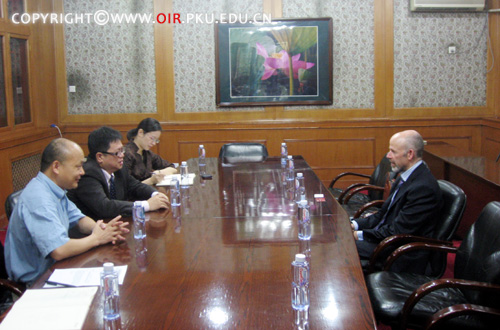News & Events | About PKU News | Contact | Site Search
Peking University, Sept.16, 2011: A delegation led by Congresswoman Judy Chu, a Democrat representing the 32nd district of California, visited the School of Transnational Law (STL) on Sept. 1 to discuss the role of caucuses in the U.S. House of Representatives in the legislative process. This was the first delegation by sitting members of Congress to visit the STL campus in Shenzhen.

Vice President and Chancellor of PKUSZ Hai Wen
The Congressional Asian Pacific American Caucus (CAPAC), which also includes Congressman Eni Faleomavaega and members of the U.S.-Asia Institute, addressed a large audience of students and faculty in STL’s Moot Court room. They discussed the need for representation of Asian and Asian American constituents in the government and the discrimination Asian Americans have faced historically.
“I think one of the virtues of the American democracy for what it stands – it’s not perfect, I can promise you that – is its ability to correct its mistakes,” said Faleomavaega. “It can talk about racism and reform it… American democracy can evolve – it continues to change.”
Chu, who was elected to Congress in 2009, spoke about her position as the first Chinese American woman in the U.S. House of Representatives and issues that she is passionate about, including immigration reform and improving U.S-China relations.
“We have more to gain from a relationship than we have to lose – and in fact, we are very much interdependent,” Chu said. “We want to make sure that we raise our voices for reason and mutual cooperation between U.S. and China. ”
During the Q&A session, students asked about Chu’s background, her identity as a Chinese American, and the delegation’s opinion on China’s one party system.
“I have to respect the fact that this is the way you currently function and operate,” Faleomavaega said. “Hopefully there is going to be a better understanding how the one-party system in your government could adapt and adjust to the realities of what the people want ultimately.”
In the afternoon, the students met with the individual delegates in small groups. First-year law student Lu Dan, who was in Chu’s group, said he was able to learn more about Chu’s challenges and achievements as an Asian American.
“They faced racial discrimination, so given the circumstances, the fact that she is very successful is very inspiring,” he said. “From this I can see that she is a very powerful and determined person.”
First-year student Chen Fei agreed. The delegation only had a few hours to spend in Shenzhen, so he regretted that he did not have time to ask a question he had about Chinese immigrants in the U.S. But it was enough that he had a chance to meet the delegation and hear them speak, he said.
“I met great people and a woman who is very confident and has responsibility to American citizens and I think that is the most important thing,” he said.
Reported by: Eunnie Park
Edited by: Liu Lu
Source: Office of International Relations